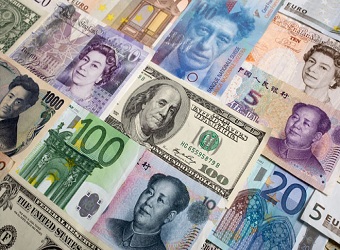The dollar struggled near a four months-low against the yen on Wednesday as a bout of investor risk aversion hit U.S. stocks and sent U.S. Treasury yields sharply lower, eroding the greenback’s interest rate allure.
The U.S. currency was off 0.1 percent at 111.670 yen after plumbing 111.430, its lowest since November 28.
The dollar also nursed large losses against the euro. On Wednesday, the common currency was a touch weaker at $1.0794 after surging 0.6 percent overnight to $1.0819, its highest since February 2.
“A key factor behind the latest currency developments was the big drop in U.S. equities. The question now is whether equities will keep falling,” said Shin Kadota, senior strategist at Barclays in Tokyo.
“Unlike the dollar and treasuries, Trump’s trade still had an impact on equities. But if such impact on equities is to fade, it would weigh on dollar/yen. The dollar will also suffer against other currencies as U.S. yields would decline.”
Wall Street fell sharply on Tuesday as investors worried that President Donald Trump will struggle to deliver promised tax cuts that propelled the market to record highs, with nervousness deepening ahead of a key healthcare vote.
Stocks in Asia followed suit on Wednesday, with Japan’s Nikkei dropping two percent.
The dollar index against a basket of major currencies was little changed at 99.849 after retreating to a 1-1/2-month low of 99.642 overnight.
“The dollar has already fallen significantly, and technical factors and a further tumble in shares would be needed for it to decline further,” said Shusuke Yamada, forex strategist at Bank of America Merrill Lynch in Tokyo.
“But this is not yet ‘risk off’ of disastrous proportions as investors still appear to retain significant cash on hand,” he added.
The greenback has faced a confluence of negative factors recently, with the dollar index pulling sharply back from a peak above 102.00 scaled at the start of March.
Dollar bulls were disappointed as the Federal Reserve hiked interest rates last week but did not signal a faster pace of future tightening as many had anticipated.
The U.S. currency has also felt pressure from a resurgent euro.
Growing expectations of a tightening in European Central Bank monetary policy this year and the possibility of anti-euro candidate Marine Le Pen being defeated in the French presidential elections have supported the common currency.
The euro rose above $1.080 for the first time in six weeks on Tuesday after centrist French presidential candidate Emmanuel Macron’s performance in a debate fuelled expectations he would win.
The pound hovered near a three-week peak of $1.2495 scaled overnight on data showing British inflation jumping above the Bank of England’s 2 percent target for the first time since late 2013.
The Australian dollar was down 0.4 percent at $0.7662 , having lost some steam after rising to a four-month high of $0.7748 at the start of the week. The wobbly U.S. dollar and higher commodity prices enabled the Aussie to reach that multi-month peak.
The benchmark ten-year Treasury note yield extended its decline to 2.41 percent, its lowest in three weeks.
Source: Reuters


